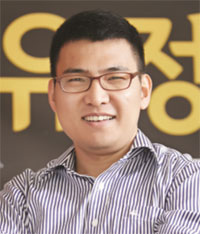 Kim Jin Ho [pictured left, Image: Daily NK] is busy at work taking orders
Kim Jin Ho [pictured left, Image: Daily NK] is busy at work taking orders
over the phone and via text message at a shop selling fertilized eggs in
Namyangju, Gyeonggi Province. His work keeps him busy, but he wouldn’t have it any other way.
Kim arrived in South Korea when he was 23
after escaping from North Korea. Not long after settling down he enrolled at
an alternative school, but he wanted to study more, and while looking for other
options came across a church-run study group. There he learned
how to write reports and essays, prepare for the college entrance exam, and other crucial skills.
Despite the perpetual onslaught of changes
Kim faced as he adapted to South Korean society, he managed to focus on his
studies, which he attributes mostly to envisioning a specific goal throughout
the process. “It wasn’t easy,” he said. “I tried my best because I knew
that if you don’t learn, you will never move forward. I
wanted to run a business, so I had to study harder than others.”
Harboring a strong interest in business
management, Kim secured a spot to major in the subject at a university, getting one step
closer to his dream. It was there he met and befriended other North Korean defectors, and slowly, if
meticulously, laid plans for his poultry farming business over the course of
three years.
These networks proved invaluable, as Kim
was able to open both a fertilized egg shop in Namyangju and a chicken farm in
Asan, South Chungcheong Province last February with the help of these former classmate companions. Lacking experience and running a fledgling business brought on a host of
difficulties, but Kim manages to put a constant smile on his face and shrug them off, saying there’s so much he doesn’t know and that learning is a lifelong process.
Dreaming of success and the future
Roughly a year after he started the
business things began to turn around. Sales were initially slow due to a
lack of advertising around the brand, but as time went by, word of mouth
helped fuel growth; people began to seek him out for the good quality product
his company was known to provide. “I’m
really happy that people don’t come to buy eggs from us
because we’re from North Korea but because the quality
is good,” Kim said. “I would
like to help other defectors that are working in the farming and livestock
industry, when they’re in trouble, and see our business
grow.”
Kim said a competition–under the theme of peaceful unification– for college students hosted by Korea Hana Foundation prompted his desire to give back to the community and foster development. He and his friends landed second
place at the competition with their submission–an experience he cites as a personal revelation
that “the process is often more important than the outcome.”
“As we were putting together our
presentation, we did research on the current status of resettlement for North
Korean defectors. It made us realize there were so many defectors that were
struggling. Up until then, I had only been interested in what to do for myself,” Kim recalled. “But after knowing how many live,
it made me think if the business does well that I would like to help others. If
there’s anything that we can do to provide advice on
feed distribution, publicity, and market trends, we’re
more than willing.”
Fully aware of the hardship and discrimination North Korean defectors face working in the farming industry in the
South, his final goal as a businessman is to have a ranch in the
North once the two Koreas are unified, a dream he believes best achieved
by helping other defectors settle down in the South in the meantime.
*This article was made possible by support
from the Korea Hana Foundation [the North Korean Refugees Foundation].
















